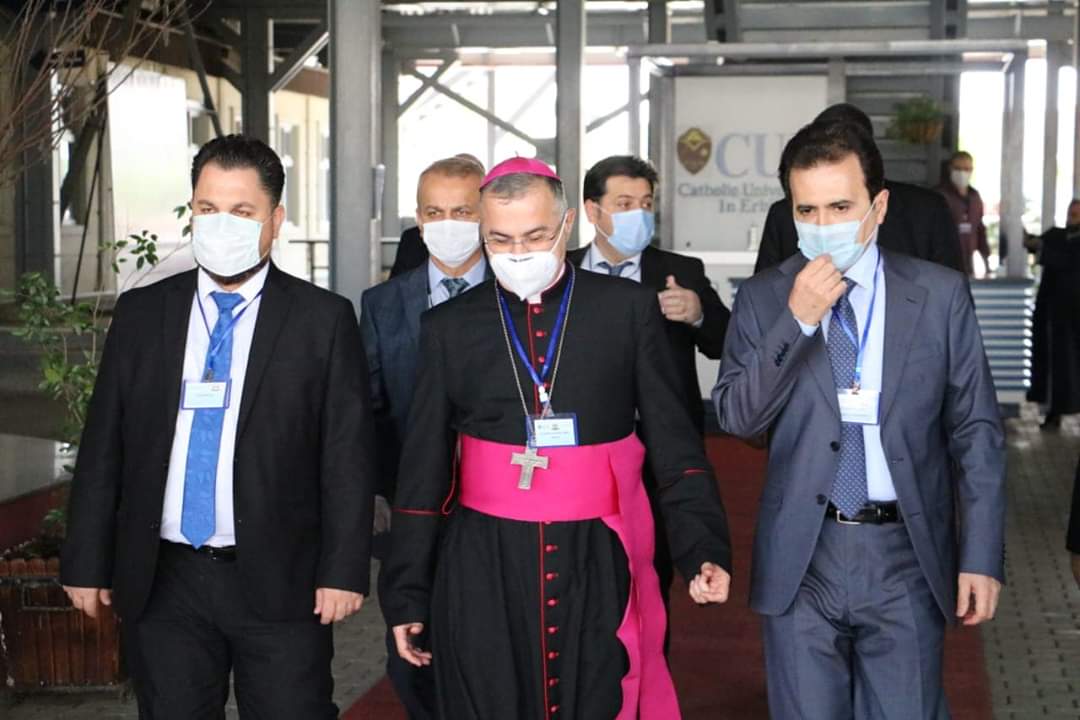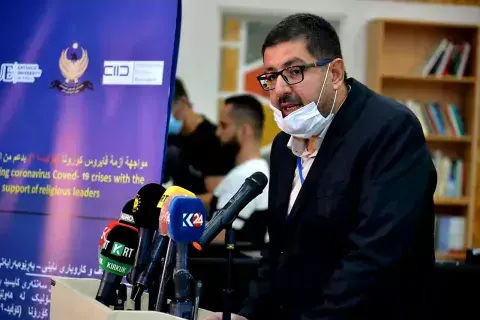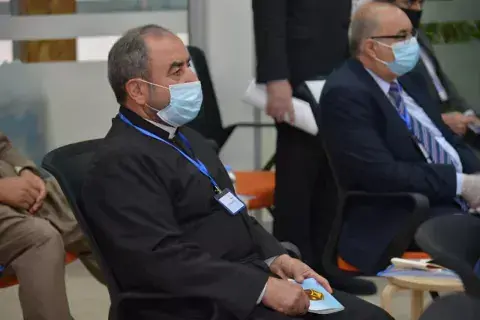
In a unique public health initiative, a KAICIID Fellow in Erbil, Kurdistan Iraq, has brought together the Ministry of Endowment and Religious Affairs and the Ministry of Health in Kurdistan to raise awareness of the dangers of COVID-19.
Barzan Baran Rashid, part of KAICIID's 2019 International Fellows Programme, is a member of the Erbil Conference of Citizenship and Peace in Iraq. He is also a preacher at the Hamid Sian Mosque of the Ministry of Endowment and Religious Affairs.
His project, targeted at bringing religious leaders and policymakers together on COVID-19 education, is part of KAICIID’s new round of grant initiatives for Fellows to help actively address the pandemic in 60 countries around the world. Together with participants from two of Iraq’s key ministries, Rashid has advocated wise responses to the pandemic in areas where adherence to “stay-at-home” policies has been low.
Rashid said collaboration between the two ministries is crucial in tackling COVID-19 in a region where more than a million people gather in most Kurdistan mosques for Friday prayers.
“Both ministries have a major influence on Kurdish society,” he said. “For example, the Ministry of Endowment and Religious Affairs runs more than 6,000 mosques and also more than 400 religious temples. Also, the Ministry of Health has a great role to play in educating society to prevent this serious disease. We managed to bring both ministries to a round table to discuss how the government and religious leaders can work together.”

Rashid said his team communicated with both ministries and explained the project's aims and objectives. “Most of the religious leaders, such as Imams, are employed by the Ministry of Endowment and Religious Affairs. So, we needed the Minister's permission to involve religious leaders in the project activities. Also, as one of the main project objectives, we needed to have health experts from the Ministry of Health to educate religious leaders about the nature of the virus and the mechanisms to prevent the spread of the virus.”
In Iraq, the long-lasting effects of conflict, as well as a shortage of resources, have created numerous hurdles in limiting the pandemic, including a lack of awareness of transitional diseases and challenges in the educational and public health sectors.
According to Rashid, Iraqis face a litany of problems in the country’s battle against the pandemic, including unemployment, poverty and problems with border crossings between Iraq and Iran.
After seeing a relatively slow spread of COVID-19 in January-May, cases jumped by 600 per cent in June, according to the International Rescue Committee. Iraq has nearly 185,000 coronavirus cases – over 6,000 people have died.
Like many other countries, COVID-19 has stretched the capacity of Iraq’s health system. As the number of cases from the pandemic has increased, hospitals have been overwhelmed and supplies of beds, protective equipment and respirators are all running low. Authorities have been forced to turn stadiums and hotels into COVID-19 wards and containment centres.
In order to reach large numbers of ordinary Iraqis, Rashid is collaborating with Baha'i, Christian, Muslim, Sabean Mandaean, Yazidi and Zoroastrian communities, training religious leaders to use their platforms to educate their followers on recommended hygiene guidelines and other practices which keep people protected from the virus.
“We conducted many activities between all the religious and national components in these difficult circumstances, for example preparing Friday sermons about the seriousness of the pandemic in all its aspects. We have encouraged religious leaders to meet the challenges facing the Iraqi people through religious sermons in the houses of worship of all religions,” he said.

As part of his KAICIID-supported work, Rashid has also used a local company called Smart Hand to educate religious leaders on social media best practices, training them to disseminate video messages which promote social cohesion between groups of different religious and ethnic backgrounds. Digital platforms like Facebook have proved to be invaluable in reaching worshippers.
“We focused on how to use the internet to educate citizens, instead of just sermons in mosques, churches and temples, creating groups between parties concerned with the crisis and sending messages to followers of different religions.”
In areas of Iraq where social media use is less prevalent, Rashid is also helping religious leaders contact individual families by dropping off letters and printed guidelines, delivered with the support of the Directorate of Health in Erbil. Rashid’s efforts were further aided by “a group of volunteer religious leaders.”
These efforts have also included some of Iraq’s more vulnerable religious communities, such as Yazidi communities in northern Iraq currently living in camps for displaced persons due to violent conflict. These communities have greatly relied on leaflets and other distributed materials in order to learn more about COVID-19 prevention. “The needs of refugees differ from the needs of indigenous peoples,” he said.
Rashid said participants, including religious leaders and policymakers, have been delighted by the initiative. “This approach was new in the region as it brought together different religious leaders and collectively sought solutions to engage COVID-19. We have received a lot of positive feedback from both ministries’ religious leaders and those who are involved in the project activities.”